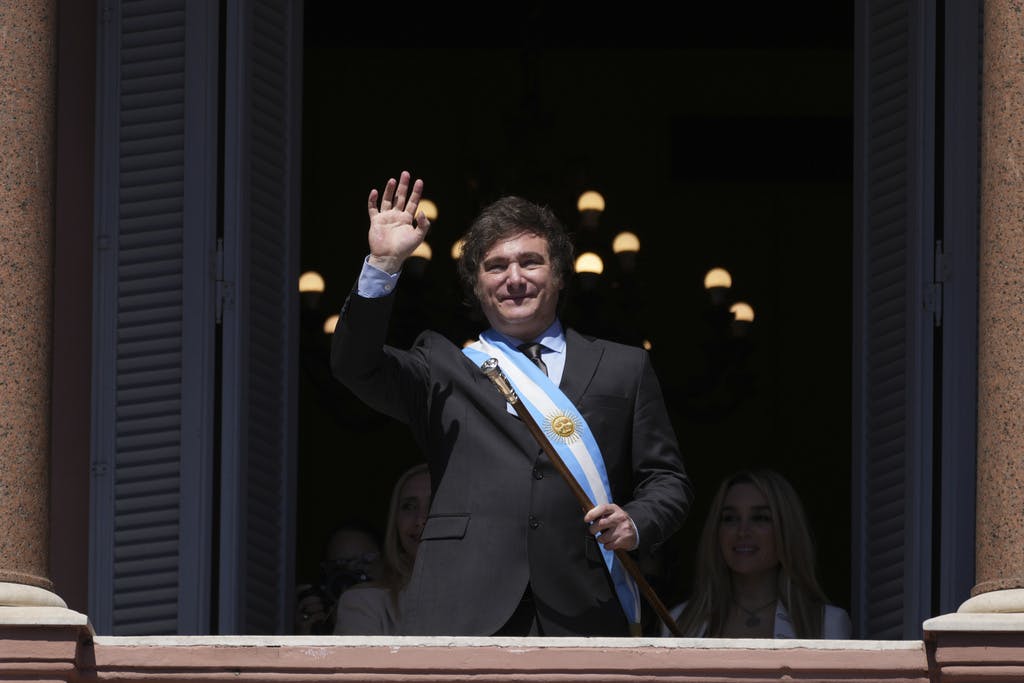Milei Makes His Move — A Reverse New Deal
‘I don’t remember anyone with so much forcefulness,’ says one of his top advisers. He’ll need it.

Call it a New Deal — in reverse. Argentina’s new president, Javier Milei, is hitting the ground running with what a top adviser calls an “overhaul of the economic power structure.” Yet while FDR’s first 100 Days were infamous for expanding government, inflating the currency, and stifling economic liberty, Mr. Milei’s ambitions are the opposite. His program offers “sweeping reforms to reduce the hand of the state in Argentina’s economy,” as Bloomberg puts it.
The goal, economist Federico Sturzenegger says, is to pivot from the stagnant statism of Perónism and “radically transform the South American nation.” Yet the left is already mobilizing to stop Mr. Milei’s reforms — backed by Argentine voters in a landslide election victory — dead in their tracks. The nation’s most powerful union, the General Confederation of Labor, has set for January 24 a general strike intended to bring the nation’s economy to a halt.
Whose point are the unions trying to make, anyhow? The general strike, if it happens, is intended to strangle Mr. Milei’s agenda in the cradle. Yet it makes all the more clear why his reforms are so critical in the first place. The unions, along with other Perónist elements in a country for decades dominated by left-wing ideology, are doubtless eyeing a reprise of the strikes that plagued the center-right administration of Maurizio Macri between 2015 and 2019.
“We are going to fight boldly,” threatens one Perónist governor, Axel Kicillof, vowing “to be much more creative and much more militant.” Yet Mr. Milei is no shrinking violet, as Mr. Sturzenegger makes clear: “I don’t remember anyone with so much forcefulness.” The new president will need it. He’s framing his agenda as a means to “kick-start the process of economic deregulation” and lift what he calls the “oppression” of the government.
While Mr. Milei has yet to put forward specifics for two of his key campaign pledges — elimination of Argentina’s central bank and dollarization of the nation’s debased peso — his proposals so far lay out a broad prosperity agenda. His opening move, a 300-point emergency presidential decree, calls for all state-owned firms to prepare for privatization, the elimination of rent controls, and sweeping deregulation to “avoid the persecution of companies.”
Mr. Milei also eyes removing limits on satellite internet service in Argentina, which could open the door to Elon Musk’s Starlink operating there. On Thursday Mr. Milei put a reform bill with 664 articles before the Argentine Congress, signaling what one political consultant calls a “very bold strategy.” If Mr. Milei’s lack of a majority in Congress presents a hurdle for the bill, the new president contends the nation’s economic crisis compels its passage.
Mr. Milei’s reform bill expands on the liberalization measures in the decree with proposals to drop primary elections, cut taxes, scrap proportional representation in legislative elections, and strengthen the president’s powers to deregulate the economy. Mr. Sturzenegger notes that the government intends next week to send yet another measure to the legislature designed to eliminate 160 “absurd” regulations that are now stifling economic growth.
A highlight of Mr. Milei’s bill is Section 209, which forbids describing as “free” any service provided by government. Rather, the bill says, “it must be made clear” that such services are “financed by taxpayers’ taxes,” Voz reports. What a contrast with Perónism (echoed in Bidenism), which, by promising a “free lunch,” ravaged the economy of what was once one of the world’s richest nations. Mr. Milei’s “shock therapy” offers a chance to get back on track.

